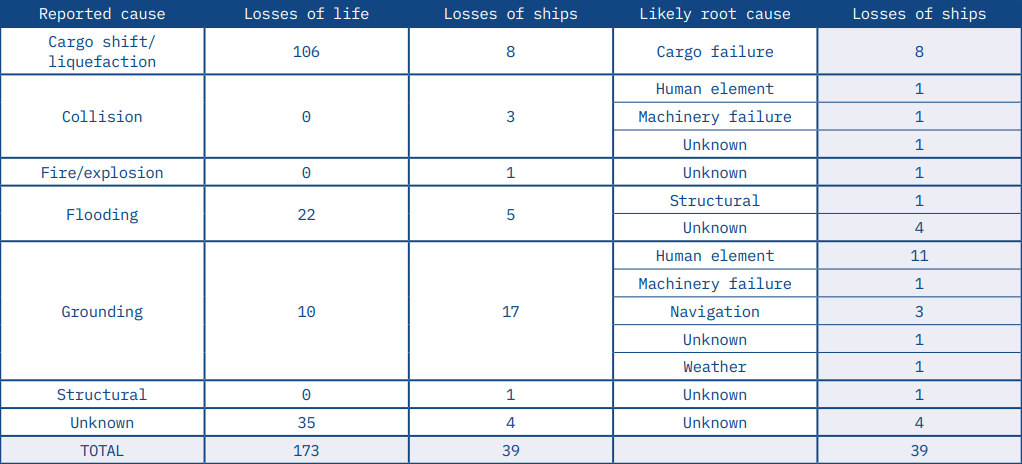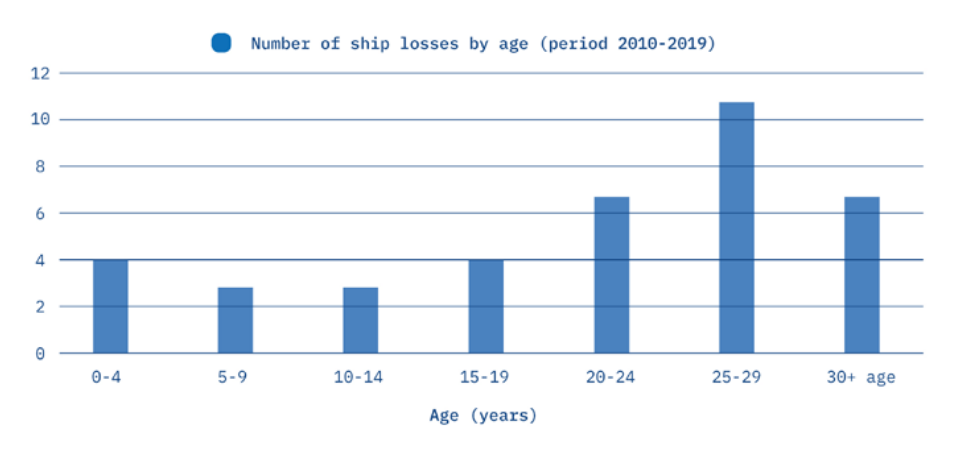search the site
Intercargo publishes Bulk Carrier Casualty Report 2019

Intercargo publishes Bulk Carrier Casualty Report 2019
INTERCARGO published its Bulk Carrier Casualty Report 2019, which includes an analysis of casualty statistics covering the timeframe between 2010 to 2019.
Casualties | 04/05/20 Key findings:
- 39 bulk carriers (of over 10,000 dwt) have been identified as total losses 1 for the years 2010 to 2019.
- Size bracket 10,000-34,999 dwt: 12 bulk carriers were lost, representing 30.8% of the total 48 casualties reported.
- Size bracket 35,000-49,999 dwt: Seven vessels were lost, representing 17.9% of the total, without a clear pattern of improvement through the years.
- Size bracket 50,000-59,999 dwt: Nine vessels were lost, representing 23.1% of the total, with five losses related to suspected cargo failure (liquefaction) and consequential loss of 72 lives.
- Size bracket 80,000+ dwt: Seven vessels were lost, or 17.9% of the total.
- Four bulk carrier losses in the size bracket 60,000-79,999 dwt equate to the lowest number of casualties, representing 10.3% of the total.
- In terms of annual ship losses, after peaking in 2011, a reduction of ship losses was observed thereafter.
The report highlights that cargo shift and/or liquefaction is one of the greatest concerns for the safe carriage of dry bulk over the past 10 years, likely to be the main reason behind eight bulk carrier casualties and 106 seafarers losing their lives. The most common reported cause of ship losses has been grounding, with 17 losses. Losses due to flooding accounted for five ships, and four ships were lost due to unknown causes, accounting for 35 lives.

Analysis of total losses for previous ten years 2010 to 2019:
- 39 bulk carriers over 10,000 dwt have been identified as lost, or on average 4 ships per year.
- 173 crew members have lost their lives as consequence, or on average 17 lives lost per year.
- The average age of the bulk carriers lost was 20.8 years.
- Vessels amounting to 2.59 million dwt have been lost, or on average 259 thousand dwt per year.

INTERCARGO applauds the latest amendment to the International Maritime Solid Bulk Cargoes Code (IMSBC 05-19), which will enter into force on January 1, 2021.
The Code states that
This cargo may suffer instability due to moisture content resulting in dynamic separation and formation of a liquid slurry (water and fine solids) above the solid material, leading to a free surface effect which may significantly affect the ship’s stability. This cargo is not liable to undergo dynamic separation when the cargo is shipped below its TML [transportable moisture limit]’ (Res MSC.462(101), adopted on 13 June 2019).
At the end of January 2020, 24 of the 39 bulk carrier losses covered in the report have had investigation reports made available on IMO GISIS, representing around 60 percent of the total. The average time from an incident to a report becoming available has been 32 months for these investigations.
Learn more about the Bulk Carrier Casualty Report by clicking here below


















